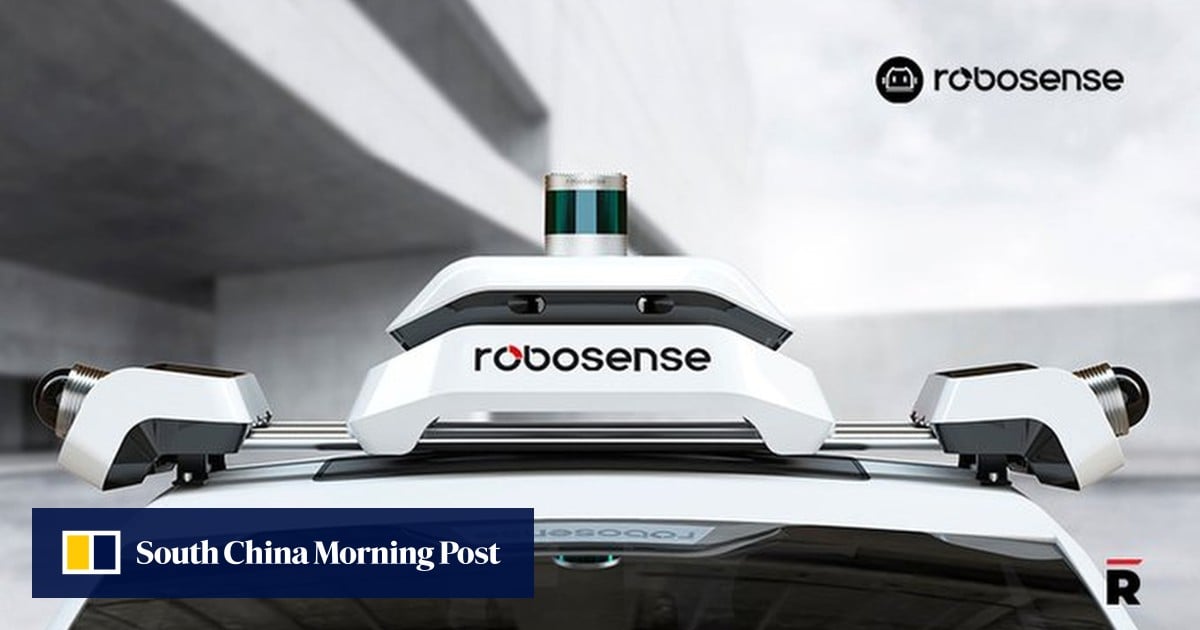
05 Jan Hong Kong’s first IPO of the year makes weak trading debut as RoboSense Technology shares drop in a tepid market
Shares of RoboSense Technology, a Chinese maker of sensors for self-driving cars, fell on their Hong Kong trading debut on Friday after the company made the city’s first initial public offering (IPO) of the year.
The Shenzhen-based company’s stock, which trades under the 2498 code, lost as much as 3.5 per cent to HK$41.50 in early trade, before ending the morning session at HK$42.10, giving it a market capitalisation of HK$18.9 billion (US$2.4 billion). Its IPO price was HK$43. In comparison, the Hang Seng Index fell 0.1 per cent to 16,622.45 at the noon break, on course for a 2.5 per cent decline in the curtailed four-day trading week.
Qiu Chungxin, RoboSense’s chairman and Qiu Chunchao, its president, struck the ceremonial gong at the Hong Kong stock exchange at 9.30am with mallets wrapped in auspicious red cloth to mark commencement of trading.
“The listing at HKEX is a milestone for RoboSense,” Qiu Chunxin said. “It means our company has now entered the international capital markets.”

The listing comes amid hopes that prospects for the Hong Kong stock market have turned a corner after a gloomy year. PwC predicts 80 companies will list in the city this year, with fundraising set to exceed HK$100 billion. In 2023, fundraising fell 56 per cent from a year ago, with 73 companies mopping up HK$46.3 billion.
Gross proceeds from the RoboSense IPO aggregated HK$985 million, and out of the net proceeds of HK$887 million, the company plans to use 45 per cent on research and development, 20 per cent on enhancing its manufacturing, testing and verification capabilities, 20 per cent on sales and marketing efforts, and the rest on partnerships and for working capital needs.
Huawei, RoboSense join open-source autonomous driving initiative
Huawei, RoboSense join open-source autonomous driving initiative
JPMorgan and China Renaissance were the joint sponsors of the IPO, while CICC Securities, CCB International, Fosun International Securities, Essence International, CMB Capital and ABC International were bookrunners.
Chinese state-owned enterprise Nanshan SEI Investment came in as a cornerstone investor, subscribing to 79 per cent of the shares on offer.
Founded in 2014, RoboSense offers products and solutions based on chip-driven, light-detection and ranging hardware, and artificial intelligence perception software that can be applied to autonomous driving and robotics.
The company is experiencing losses as it is still at a “ramp-up stage”, according to its IPO prospectus, and expects to record losses in the current year. RoboSense posted a net loss of 244 million yuan (US$34 million) in the first six months of last year and a deficit of 563 million yuan in 2022.
“We are not able to predict when we will be able to start generating net profits and net operating cash inflow due to the fast-evolving business environment and competitive landscape,” it said in its prospectus.
RoboSense counts Alibaba’s logistics arm Cainiao as its biggest non-founding shareholder, with a stake of 10 per cent.
